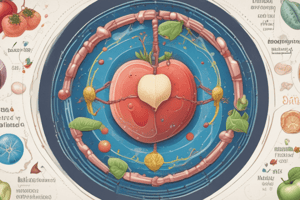Podcast
Questions and Answers
Match the following electrolytes with their roles in the body:
Match the following electrolytes with their roles in the body:
Sodium = Muscle contraction Chlorine = Fluid balance Potassium = Nerve function Calcium = Bone health
Match the following functions of water with their descriptions:
Match the following functions of water with their descriptions:
Solvent = Dissolves nutrients Temperature control = Regulates body heat Lubrication = Reduces friction in joints Protection = Cushions vital organs
Match the following statements concerning fluid balance with their consequences:
Match the following statements concerning fluid balance with their consequences:
Dehydration = Inadequate fluid intake Overhydration = Excess water consumption Electrolyte imbalance = Disruption of charging balance Edema = Swelling due to fluid retention
Match the following minerals with their charges:
Match the following minerals with their charges:
Match the following benefits of electrolytes with their outcomes:
Match the following benefits of electrolytes with their outcomes:
Match the following body weight percentage with water:
Match the following body weight percentage with water:
Match the following body functions with their corresponding specific tasks:
Match the following body functions with their corresponding specific tasks:
Match the following types of fluids with their categories:
Match the following types of fluids with their categories:
Match the following electrolytes with their primary function:
Match the following electrolytes with their primary function:
Match the following electrolytes with their health-related issues:
Match the following electrolytes with their health-related issues:
Match the following electrolytes with their major food sources:
Match the following electrolytes with their major food sources:
Match the following electrolytes with their roles in the body:
Match the following electrolytes with their roles in the body:
Match the following electrolytes with their location or abundance:
Match the following electrolytes with their location or abundance:
Match the following electrolytes with their mechanism of action:
Match the following electrolytes with their mechanism of action:
Match the following electrolytes with their deficiency effects:
Match the following electrolytes with their deficiency effects:
Match the following electrolytes with their regulatory organs:
Match the following electrolytes with their regulatory organs:
Match the function of water in the body with its description:
Match the function of water in the body with its description:
Match the body fluid with its primary role:
Match the body fluid with its primary role:
Match the properties of water with their impact on the body:
Match the properties of water with their impact on the body:
Match the temperature condition with its consequence:
Match the temperature condition with its consequence:
Match the substance with its role regarding electrolytes:
Match the substance with its role regarding electrolytes:
Match the bodily organ with its watery component:
Match the bodily organ with its watery component:
Match the organism's adaptation with the function of water:
Match the organism's adaptation with the function of water:
Match the fluid with its corresponding source:
Match the fluid with its corresponding source:
Match the term with its definition:
Match the term with its definition:
Match the health consequence with its related cause:
Match the health consequence with its related cause:
Match the hydration status with its commonality:
Match the hydration status with its commonality:
Match the organization with its publication year:
Match the organization with its publication year:
Match the type of water with its benefits:
Match the type of water with its benefits:
Match the disease with its associated hydration issue:
Match the disease with its associated hydration issue:
Match the effect with the hydration condition:
Match the effect with the hydration condition:
Match the type of hydration with the needed response:
Match the type of hydration with the needed response:
Study Notes
Water Composition and Role
- Water comprises about 60% of an adult's body weight.
- Essential for chemical reactions, body temperature regulation, blood volume maintenance, and lubrication.
- Functions as a solvent and transport medium in the body.
Electrolytes Overview
- Electrolytes are electrically charged minerals including sodium, chloride, potassium, calcium, phosphate, and magnesium.
- Crucial for water distribution, conducting electrical charges in cells, muscle contraction, and hydration balance.
Functions of Water
- Transportation: Known as the "universal solvent," enables substance dissolution for transport in blood, urine, saliva, and other fluids.
- Chemical Reactions: Acts as an ideal medium with a stable pH of 7.0; essential for metabolic reactions.
- Lubrication and Shock Absorption: Provides cushioning for joints, eyes, brain, and spinal cord, protecting against sudden changes.
- Temperature Regulation: Maintains body temperature (set at 98.6°F or 37°C) by regulating water movement and heat distribution.
Importance of Electrolyte Balance
- Water in the body contains electrolytes that regulate fluid movement within and outside of cells.
- Key electrolytes include sodium, chloride, potassium, calcium, phosphate, and magnesium.
Sodium
- Primary regulator of water balance; involved in nerve transmission, muscle contraction, and nutrient absorption.
- Kidneys manage sodium levels; excess can lead to hypertension.
Chlorine
- Maintains fluid balance and neutrality; aids in pancreatic juice flow and mucus production.
- Found in foods like tomatoes, lettuce, and can be sourced from table salt.
Potassium
- Most abundant cation inside cells; crucial for fluid balance, kidney function, muscle contraction, and nerve transmission.
- Rich sources include fruits (bananas, avocados) and vegetables (potatoes, leafy greens).
Calcium
- Vital for stable blood pressure, skeletal muscle contraction, and building strong bones and teeth.
Phosphate
- Managed by kidneys, bones, and intestines; important for various biological functions and interacts closely with calcium.
Magnesium
- Regulates muscle contraction, heart rhythm, and nerve functions; a crucial mineral for overall health.
Health Implications of Water and Electrolyte Imbalance
- Overhydration: Excessive water intake can dilute electrolytes, impair bodily functions, and potentially cause death.
- Dehydration: Common and dangerous, leading to severe health issues, including diarrhea-induced deaths and increased risks for kidney stones and heat-related illnesses.
Conclusion
- Regular water suffices for general hydration needs, although electrolyte water may be beneficial in specific situations.
Studying That Suits You
Use AI to generate personalized quizzes and flashcards to suit your learning preferences.
Related Documents
Description
Explore the essential topics of water and electrolytes in food biochemistry as presented in the University of Juba's Food and Nutrition program. This quiz covers key biochemical concepts crucial for understanding the role of these components in nutrition and health. Perfect for fourth-year students enrolled in the course.



